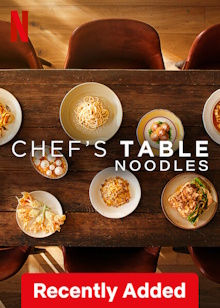My wife felt like a change from the usual television shows that we watch and wanted to try a cooking show. The latest season of this long-running, award-winning show popped up on Netflix, with each season focusing on a different cuisine, so I thought we’d check it out. Each episode is indeed filled with exquisite visuals of perfectly crafted dishes but the focus is really on the biographies of noteworthy chefs rather than the food itself. It’s okay but not really what we were looking for so we’re glad it’s only four episodes.
As is obvious, the theme of this season are noodles with each of the selected chefs specializing in a different form of it. Evan Funke is an American from a privileged background who struggled to find his calling in life until he decided to travel to Italy to learn how to make pasta by hand. Guirong Wei comes from the impoverished province of Shaanxi in China. Motivated by the need to make money, she picks up cooking as a trade and her career takes her all the way to opening restaurants of her own in London. Peppe Guida seemingly stayed in Italy his entire career and called on his family to build up a successful family-style restaurant overlooking the Bay of Naples, complete with produce grown on his own land. Finally Nite Yun was born in a refugee camp in Cambodia and emigrated as a child to the United States. Feeling unfulfilled in a job as a nurse, she travels back to Cambodia to learn about Khmer culture and decides to make a living with Khmer cuisine, starting with pop-up stalls and ending in thriving restaurants in California.
Naturally food is the center of all of these stories and interestingly it’s all traditional cuisine directly derived from their respective cultures here. No fusion food and avant-garde experiments. However this show really tells the stories of the individual chefs themselves rather than the cuisine they champion. The beautiful camerawork captures each finished dish in loving detail but this isn’t a cooking show so there’s not much information about the process or even the ingredients that go into them. It doesn’t even want to provide historical background information. For example when asked about difference between Cambodian cuisine and Thai or Vietnamese cuisine, Yun’s answers seem wishy-washy and unspecific. It’s amusing to me that in the very first episode, Funke makes such a big deal about handmade pasta and how it tastes different. But a couple of episodes later Guida seemingly doesn’t care much about that for his own pasta and focuses instead on the basic, high quality ingredients that complete his dishes. I’d say this is a show that is low on informational content and high on feelings. The commentary is filled with emotional words like ‘passion’ and ‘love’ and so on. Granted, it’s true that food is able to elicit powerful, visceral feelings in people but I’m not sure that makes for a good food documentary.
As it is, it’s really more of a showcase of successful, driven businesspeople who can be seen as role models. It’s one thing to love food and be diligent enough to learn to cook. It’s another to set up and run a world-class restaurant. Funke notes that the first time around, he didn’t pay any attention at all to the business side of the business and so the restaurant failed. In the case of Yun, she explicitly learned to cook in order to be able to start the restaurant she wanted. At the same time, these are all basically normal people with their own personal, familial and emotional baggage. They’ve all had to grapple with tragedy, poverty, lack of direction and so on, to reach where they now are, and there’s a lesson there for younger generations. There are plenty of other business shows around of course but from what I can tell, those mostly feature bombastic, hustler types especially since the reality show-style likes to ramp up the drama. It’s kind of refreshing to see these more down to earth types making a success of their lives and their careers.
This series was created by David Gelb who shot to fame after the success of Jiro Dreams of Sushi. I’m not sure how involved he still is in the show after so many seasons and this is certainly a step down from that extraordinary documentary. What made Jiro Ono’s story so compelling was that he is so dedicated to perfection in his craft that there’s something inhuman about it. Each of the chefs featured here may be talented and successful, but they don’t share that strange eccentricity and so aren’t that exciting to watch.
